- NEW: Armstrong's lawyer blasts allegations as a "one-sided hatchet job"
- NEW: Three team members will contest the accusations, the doping agency says
- The agency says this was "the most sophisticated" doping program in cycling
- Armstrong has long denied using performance-enhancing drugs
(CNN) -- Cyclist Lance Armstrong was part of "the most sophisticated, professionalized and successful doping program that sport has ever seen," the U.S. Anti-Doping Agency said Wednesday in preparing to release more than 1,000 pages of evidence in the case.
The evidence involving the U.S. Postal Service-sponsored cycling team encompasses "direct documentary evidence including financial payments, e-mails, scientific data and laboratory test results that further prove the use, possession and distribution of performance-enhancing drugs by Lance Armstrong," the agency said.
Armstrong lawyer Tim Herman dismissed what he called a "one-sided hatchet job" and a "government-funded witch hunt" against the seven-time Tour de France winner, who has consistently denied doping accusations.
But the USADA said 11 riders had come forward to acknowledge their use of banned performance-enhancing drugs while on the team. Among them are George Hincapie, Armstrong's teammate during his winning Tour de France runs.
What's behind the Armstrong headlines
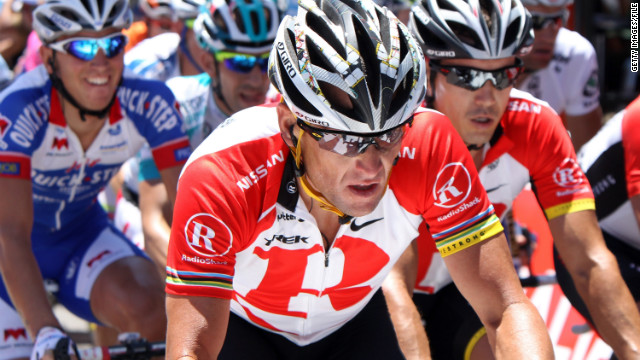 The United States Anti-Doping Agency has brought formal charges against Lance Armstong, a seven-time Tour de France champion. He denies using performance-enhancing drugs. Click through the gallery to see other athletes accused of using drugs to boost their careers.
The United States Anti-Doping Agency has brought formal charges against Lance Armstong, a seven-time Tour de France champion. He denies using performance-enhancing drugs. Click through the gallery to see other athletes accused of using drugs to boost their careers. 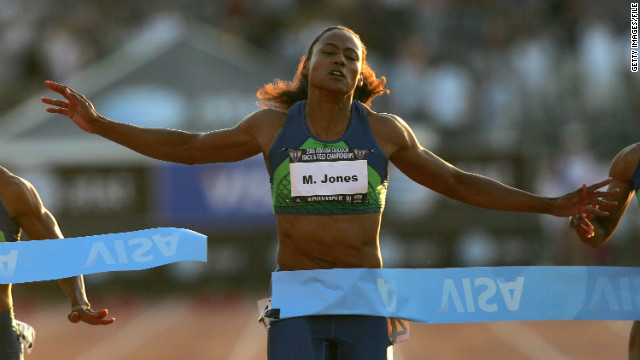 Olympic track star Marion Jones was sentenced to six months in prison in 2008 for lying to federal prosecutors investigating the use of performance-enhancing substances.
Olympic track star Marion Jones was sentenced to six months in prison in 2008 for lying to federal prosecutors investigating the use of performance-enhancing substances. 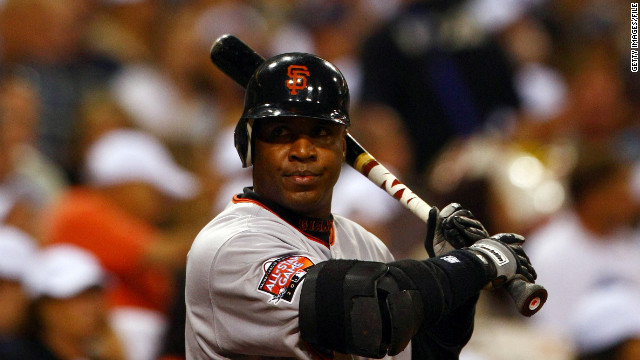 Baseball outfielder Barry Bonds, the single-season and all-time home run record holder, was convicted in 2011 of obstruction of justice for impeding a grand jury investigating the use of performance-enhancing drugs. Bonds had testified that he thought his personal trainer was giving him arthritis balm and flaxseed oil, not steroids or testosterone.
Baseball outfielder Barry Bonds, the single-season and all-time home run record holder, was convicted in 2011 of obstruction of justice for impeding a grand jury investigating the use of performance-enhancing drugs. Bonds had testified that he thought his personal trainer was giving him arthritis balm and flaxseed oil, not steroids or testosterone. 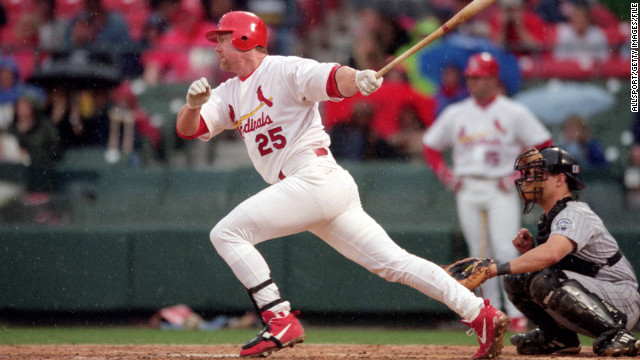 Slugger Mark McGwire evaded questions about steroid use before Congress in 2005 but in 2010 admitted that he had used steroids during the 1990s.
Slugger Mark McGwire evaded questions about steroid use before Congress in 2005 but in 2010 admitted that he had used steroids during the 1990s.  Pitching legend Roger Clemens is on trial on charges that he lied to Congress in 2008 about being injected with human growth hormone and steroids by his former trainer.
Pitching legend Roger Clemens is on trial on charges that he lied to Congress in 2008 about being injected with human growth hormone and steroids by his former trainer. 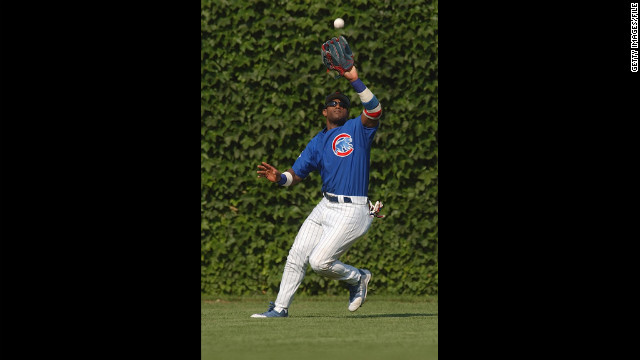 Home-run hitter Sammy Sosa was among the players who tested positive for performance-enhancing drugs in 2003 testing by Major League Baseball, according to the New York Times.
Home-run hitter Sammy Sosa was among the players who tested positive for performance-enhancing drugs in 2003 testing by Major League Baseball, according to the New York Times. 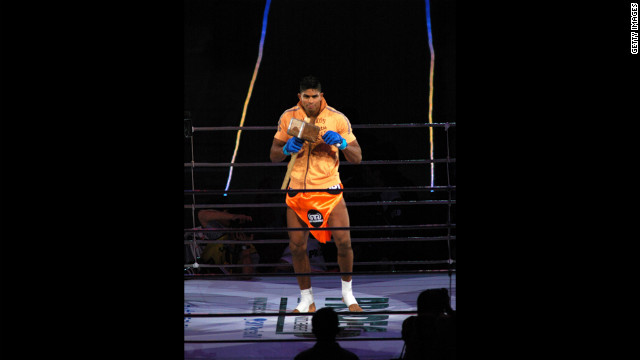 Mixed martial arts heavyweight fighter Alistair Overeem failed a random drug test in 2012 but blames it on prescribed anti-inflammatory medication for an injury.
Mixed martial arts heavyweight fighter Alistair Overeem failed a random drug test in 2012 but blames it on prescribed anti-inflammatory medication for an injury. 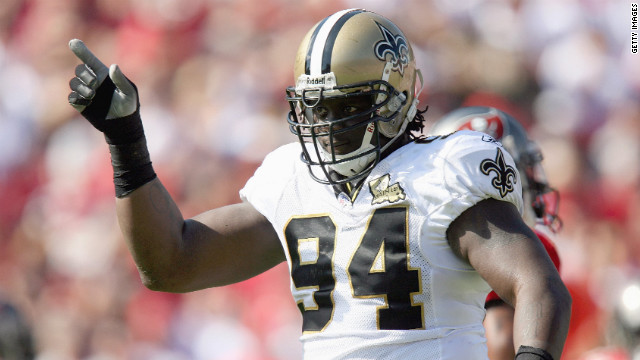 New Orleans Saints defensive lineman Charles Grant tested positive for banned substances in 2008 and was suspended for the rest of the season. He is currently a free agent.
New Orleans Saints defensive lineman Charles Grant tested positive for banned substances in 2008 and was suspended for the rest of the season. He is currently a free agent. 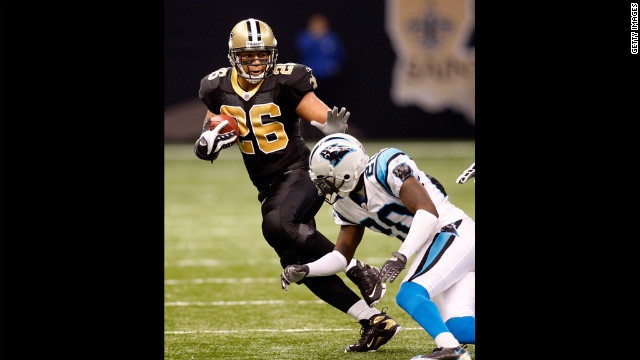 Former New Orleans Saints running back Deuce McAllister tested positive for a banned diuretic in 2008.
Former New Orleans Saints running back Deuce McAllister tested positive for a banned diuretic in 2008. 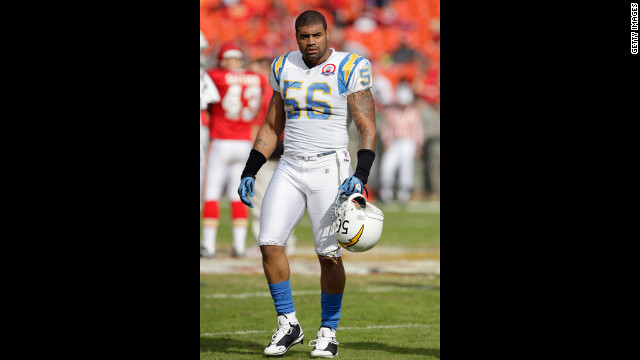 Shawne Merriman, then of the San Diego Chargers, was suspended for four games after testing positive for steroids in 2006.
Shawne Merriman, then of the San Diego Chargers, was suspended for four games after testing positive for steroids in 2006. 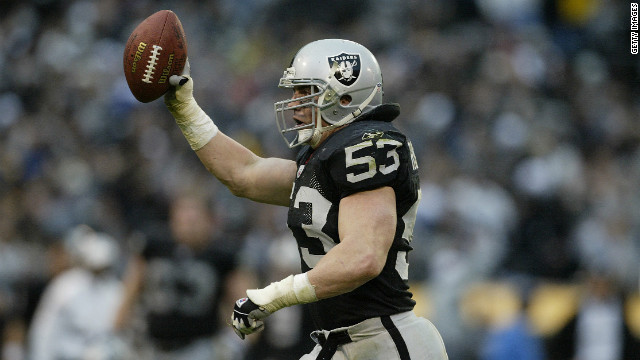 Former linebacker Bill Romanowski admitted using steroids during his career.
Former linebacker Bill Romanowski admitted using steroids during his career. 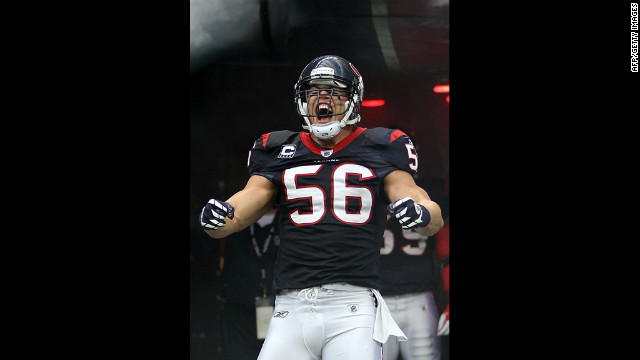 Houston Texans linebacker Brian Cushing was suspended for four games after violating the NFL policy on performance-enhancing drugs in 2010.
Houston Texans linebacker Brian Cushing was suspended for four games after violating the NFL policy on performance-enhancing drugs in 2010.  Sport's era of shame?
Sport's era of shame? "Early in my professional career, it became clear to me that, given the widespread use of performance-enhancing drugs by cyclists at the top of the profession, it was not possible to compete at the highest level without them," Hincapie said in a written statement. "I deeply regret that choice and sincerely apologize to my family, teammates and fans."
Three members of the Postal Service team will contest the accusations, the agency said. They are team director Johan Bruyneel, team doctor Pedro Celaya and Jose "Pepe" Marti, the team trainer. Each will get a hearing before an independent judge, according to the agency.
The agency compiled the evidence as part of its investigation into doping allegations that have dogged Armstrong and the Postal Service team for years. The organization is not a governmental agency but is designated by Congress as the country's official anti-doping organization for Olympic sports.
In August, four days after a federal judge dismissed Armstrong's lawsuit seeking to block the agency's investigation, Armstrong announced he would no longer fight the accusations. The agency then announced it would ban Armstrong from the sport for life and strip him of his titles dating back to 1998.
Armstrong: It's time to move forward
The agency praised the 11 riders who came forward to document the widespread use of banned substances by the team. But in a statement issued Wednesday afternoon, attorney Herman called the expected USAA report "a taxpayer-funded tabloid piece rehashing old, disproved, unreliable allegations, based largely on axe-grinders, serial perjurers, coerced testimony, sweetheart deals and threat-induced stories."
In addition to Hincapie, the agency identified the cyclists who came forward as Frankie Andreu, Michael Barry, Tom Danielson, Tyler Hamilton, Floyd Landis, Levi Leipheimer, Stephen Swart, Christian Vande Velde, Jonathan Vaughters and David Zabriskie.
"It took tremendous courage for the riders on the USPS Team and others to come forward and speak truthfully. It is not easy to admit your mistakes and accept your punishment," the agency said.
The agency said those riders would receive various punishments, including suspensions and disqualifications.
The scope of evidence against the team is "overwhelming," according to the agency.
 Brennan on Armstrong: 'He gave up'
Brennan on Armstrong: 'He gave up' 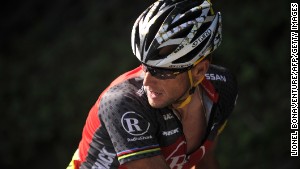 Armstrong won't fight doping charges
Armstrong won't fight doping charges 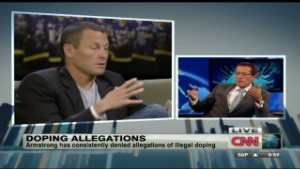 A snapshot of Lance Armstrong's future
A snapshot of Lance Armstrong's future "The USPS Team doping conspiracy was professionally designed to groom and pressure athletes to use dangerous drugs, to evade detection, to ensure its secrecy and ultimately gain an unfair competitive advantage through superior doping practices," the agency said.
Your Armstrong questions answered
Armstrong became a household name not only in Europe, where cycling is wildly popular, but also in the United States, where the sport traditionally attracted little attention before he embarked on a remarkable stretch between 1999 and 2005 during which he won seven consecutive Tour de France titles. The wins came amid persistent accusations that he had used performance-enhancing drugs.
Author and cycling journalist Bill Strickland compared the case to baseball's "Black Sox" scandal, when Chicago White Sox players conspired with gamblers to throw the 1919 World Series. But he said Armstrong is "not interested in ever admitting to his guilt, and he just wants to move on right now."
"Despite this evidence and despite all the evidence that has come out, he's got a strong core of people who believe in him and will always believe in him because of his link to fighting cancer," said Strickland, who chronicled Armstrong's 2009 return to the Tour de France in a 2011 book.
But how Armstrong might move on is unclear.
"Certainly, he's not going to be able to move on within the sport," Strickland told CNN. "It seems likely that all of his Tour victories will be stripped. He won't be allowed to participate in any sports that are signatories of WADA, the World Anti-Doping Agency. But he's found a few triathlons to do in the meantime."
And he said the allegations could lead to the reopening of a criminal case against Armstrong that federal prosecutors closed without charges in February.
"What's next is years and years of fighting if the criminal case is reopened," Strickland said.
The USADA opened its own case, which does not carry criminal penalties, in June.
In his statement Wednesday, Hincapie said he had been approached by federal investigators two years ago to discuss his knowledge of the doping activities by the team.
He did not mention Armstrong by name.
Opinion: Armstrong and the tenuous nature of heroism
"I would have been much more comfortable talking only about myself, but understood that I was obligated to tell the truth about everything I knew. So that is what I did," Hincapie said.
"Cycling has made remarkable gains over the past several years and can serve as a good example for other sports," he said. "Thankfully, the use of performance-enhancing drugs is no longer embedded in the culture of our sport, and younger riders are not faced with the same choice we had."
Barry, another of the 11 who testified about their involvement in doping practices, said he would accept his punishment and hopes the details will help strengthen efforts to root out and end doping across the sport.
"Progressive change is occurring," he said. "My hope is that this case will further that evolution."
Armstrong's cancer foundation still strong



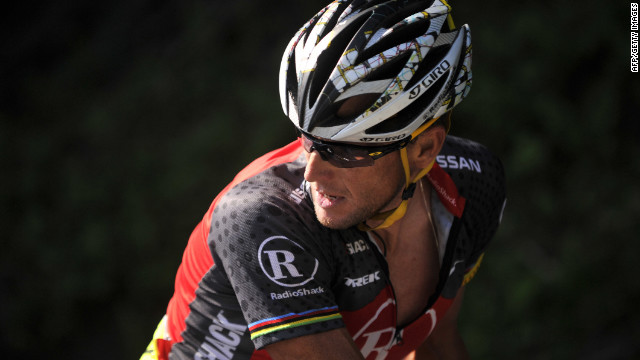 Seven-time Tour de France champion Lance Armstrong has denied numerous accusations of doping over the years. Look back at his record-setting career.
Seven-time Tour de France champion Lance Armstrong has denied numerous accusations of doping over the years. Look back at his record-setting career. 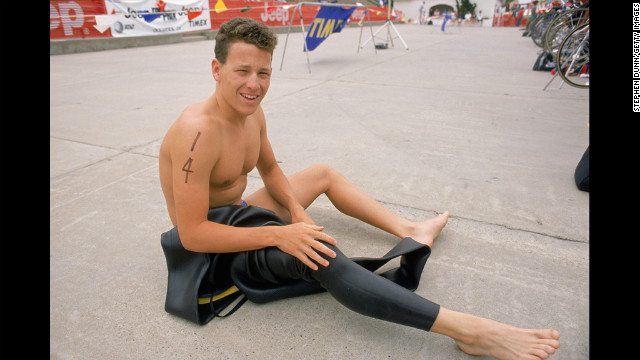 Armstrong, 17, competes in the Jeep Triathlon Grand Prix in 1988. He became a professional tri-athlete at age 16 and joined the U.S. National Cycling Team two years later.
Armstrong, 17, competes in the Jeep Triathlon Grand Prix in 1988. He became a professional tri-athlete at age 16 and joined the U.S. National Cycling Team two years later. 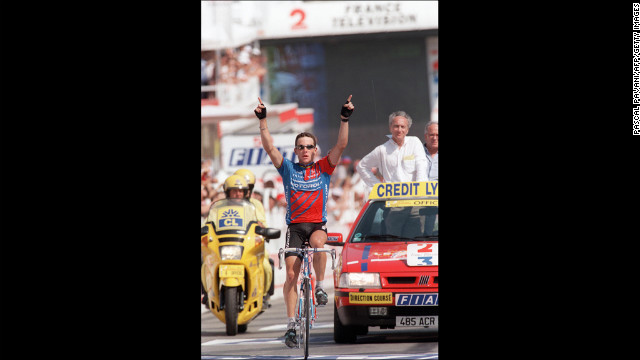 In 1995, Armstrong wins the 18th stage of the Tour de France. He finished 36th overall and finished the race for the first time that year.
In 1995, Armstrong wins the 18th stage of the Tour de France. He finished 36th overall and finished the race for the first time that year. 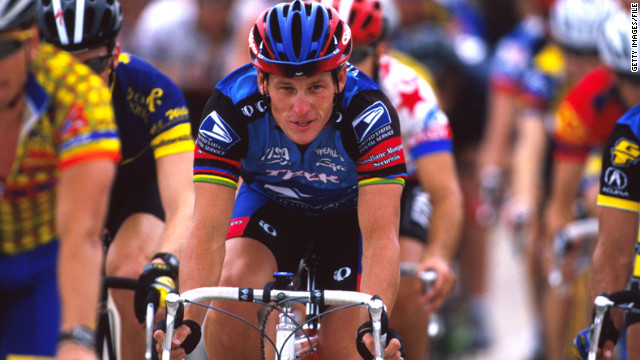 Armstrong rides for charity in May 1998 at the Ikon Ride for the Roses to benefit the Lance Armstrong Foundation. He established the foundation to benefit cancer research after being diagnosed with testicular cancer in 1996. After treatment, he was declared cancer-free in February 1997.
Armstrong rides for charity in May 1998 at the Ikon Ride for the Roses to benefit the Lance Armstrong Foundation. He established the foundation to benefit cancer research after being diagnosed with testicular cancer in 1996. After treatment, he was declared cancer-free in February 1997. 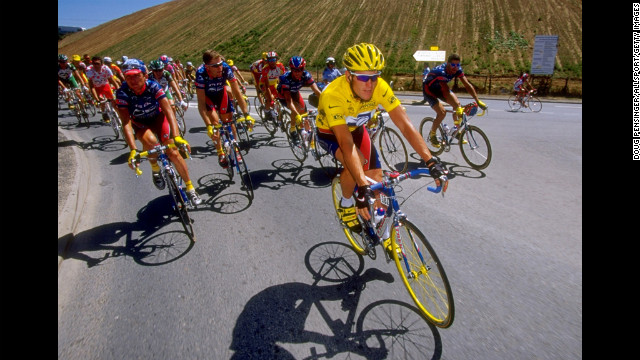 Armstrong leads his teammates during the final stage of the 1999 Tour de France.
Armstrong leads his teammates during the final stage of the 1999 Tour de France. 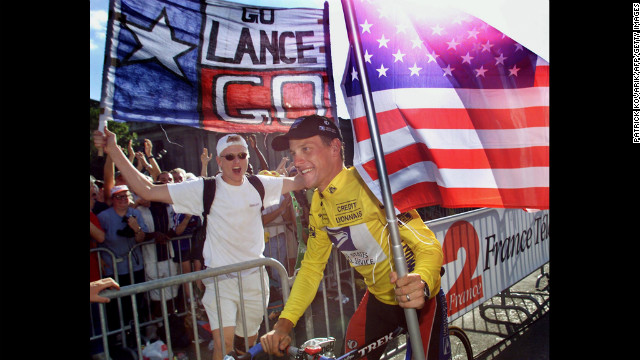 Armstrong takes his honor lap on the Champs Elysees in Paris after winning the Tour de France for the first time in 1999.
Armstrong takes his honor lap on the Champs Elysees in Paris after winning the Tour de France for the first time in 1999. 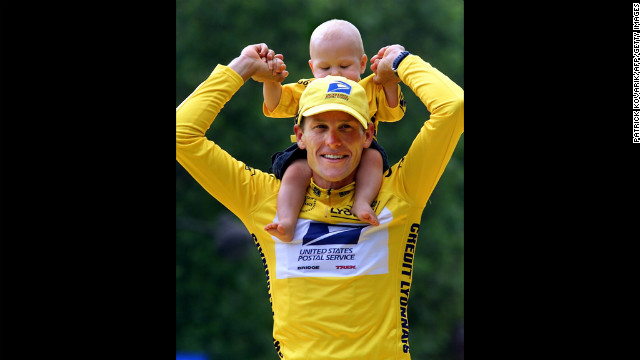 After winning the 2000 Tour de France, Armstrong holds his son Luke on his shoulders.
After winning the 2000 Tour de France, Armstrong holds his son Luke on his shoulders.  Armstrong rides during the 18th stage of the 2001 Tour de France. He won the tour that year for the third consecutive time.
Armstrong rides during the 18th stage of the 2001 Tour de France. He won the tour that year for the third consecutive time. 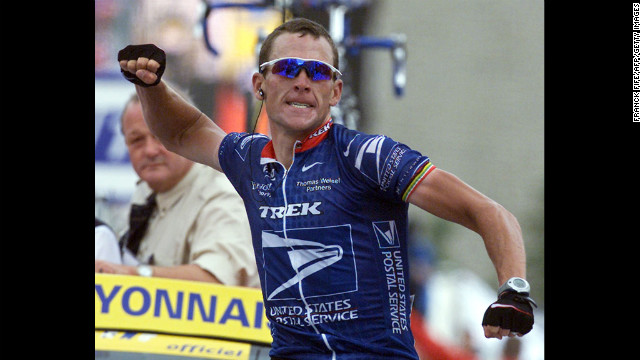 Armstrong celebrates winning the 10th stage of the Tour de France in 2001.
Armstrong celebrates winning the 10th stage of the Tour de France in 2001. 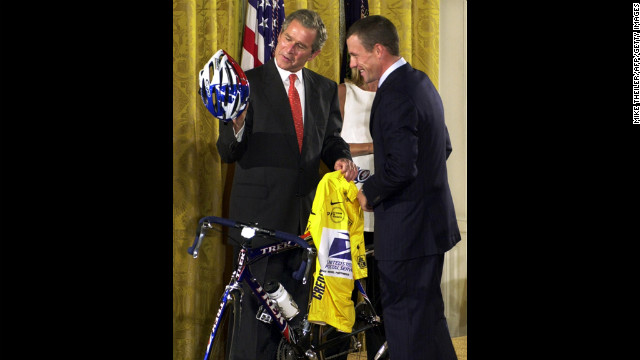 After winning the 2001 Tour de France, Armstrong presents President George W. Bush with a U.S. Postal Service yellow jersey and a replica of the bike he used to win the race.
After winning the 2001 Tour de France, Armstrong presents President George W. Bush with a U.S. Postal Service yellow jersey and a replica of the bike he used to win the race. 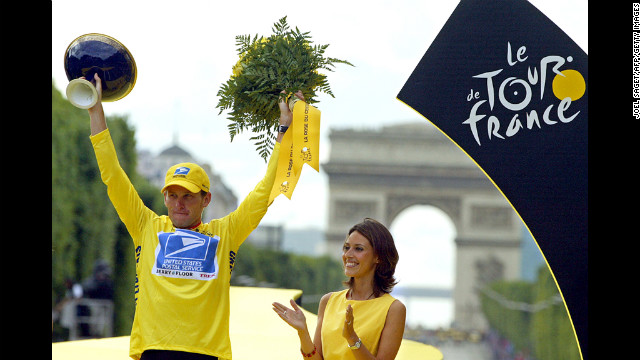 Armstrong celebrates on the podium after winning the Tour de France by 61 seconds in 2003. It was his fifth consecutive win.
Armstrong celebrates on the podium after winning the Tour de France by 61 seconds in 2003. It was his fifth consecutive win. 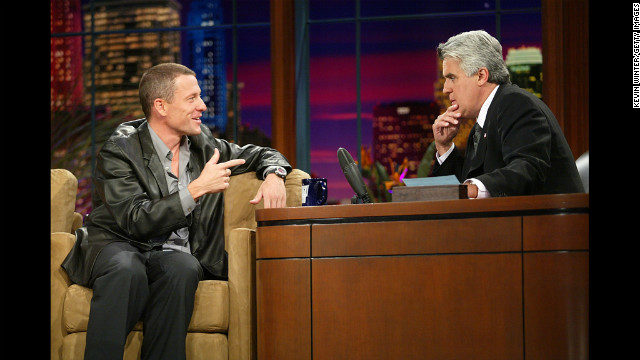 Jay Leno interviews Armstrong on "The Tonight Show" in 2003.
Jay Leno interviews Armstrong on "The Tonight Show" in 2003. 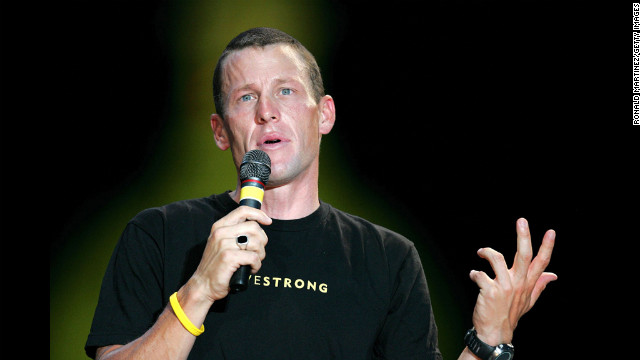 After his six consecutive Tour de France win in 2004, Armstrong attends a celebration in his honor in front of the Texas State Capitol in Austin.
After his six consecutive Tour de France win in 2004, Armstrong attends a celebration in his honor in front of the Texas State Capitol in Austin. 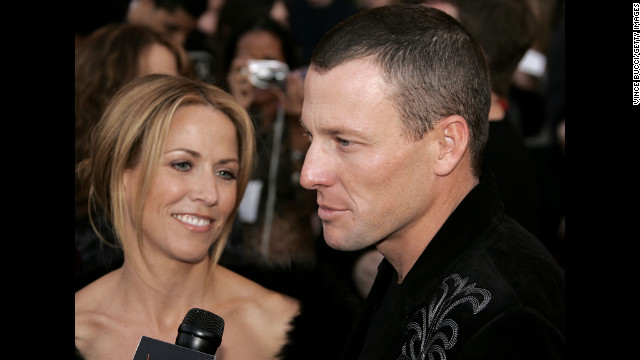 Armstrong arrives at the 2005 American Music Awards in Los Angeles with his then-fiancee Sheryl Crow. The couple never made it down the aisle, splitting up the following year.
Armstrong arrives at the 2005 American Music Awards in Los Angeles with his then-fiancee Sheryl Crow. The couple never made it down the aisle, splitting up the following year. 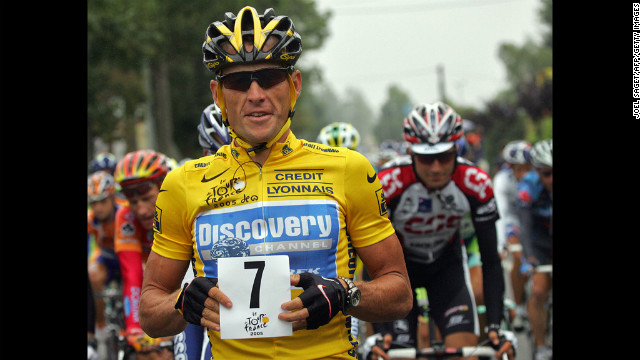 Armstrong holds up a paper displaying the number seven at the start of the Tour de France in 2005. He went on to win his seventh consecutive victory.
Armstrong holds up a paper displaying the number seven at the start of the Tour de France in 2005. He went on to win his seventh consecutive victory. 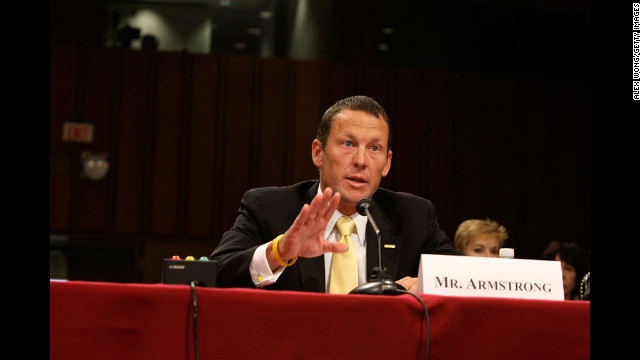 As a cancer survivor, Armstrong testifies during a Senate hearing in 2008 on Capitol Hill. The hearing focused on finding a cure for cancer in the 21st century.
As a cancer survivor, Armstrong testifies during a Senate hearing in 2008 on Capitol Hill. The hearing focused on finding a cure for cancer in the 21st century. 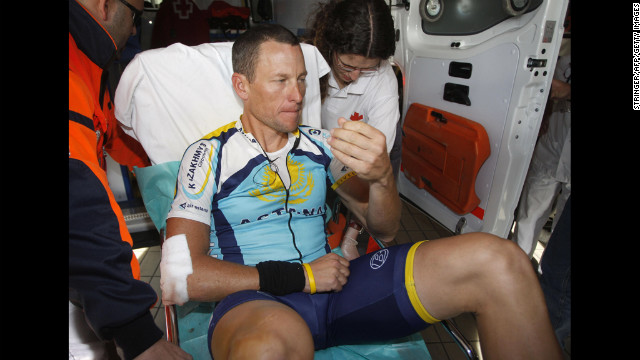 In 2009, Armstrong suffers a broken collarbone after falling during a race in Spain along with more than a dozen other riders.
In 2009, Armstrong suffers a broken collarbone after falling during a race in Spain along with more than a dozen other riders. 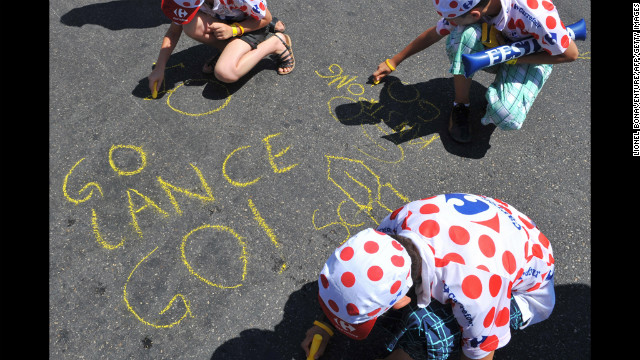 Young Armstrong fans write messages on the ground using yellow chalk ahead of the 2009 Tour de France. He came in third place that year.
Young Armstrong fans write messages on the ground using yellow chalk ahead of the 2009 Tour de France. He came in third place that year. 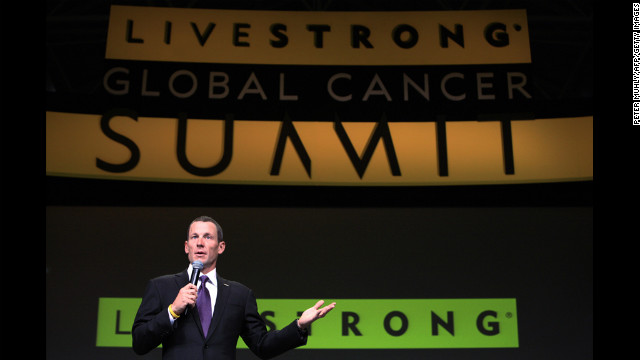 Armstrong launches the three-day Livestrong Global Cancer Summit in 2009 in Dublin, Ireland. The event was organized by his foundation.
Armstrong launches the three-day Livestrong Global Cancer Summit in 2009 in Dublin, Ireland. The event was organized by his foundation. 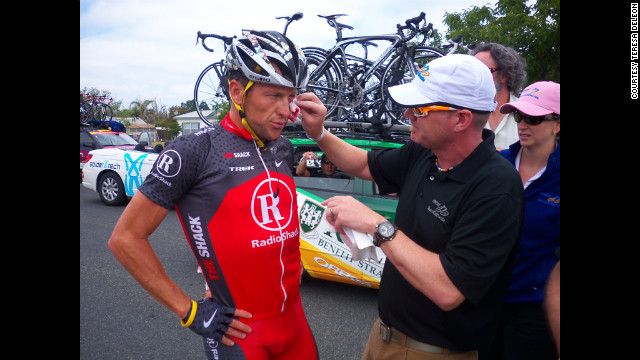 In May 2010, Armstrong crashes during the Amgen Tour of California and is taken to the hospital. That same day, he denied allegations of doping made by former teammate Floyd Landis.
In May 2010, Armstrong crashes during the Amgen Tour of California and is taken to the hospital. That same day, he denied allegations of doping made by former teammate Floyd Landis. 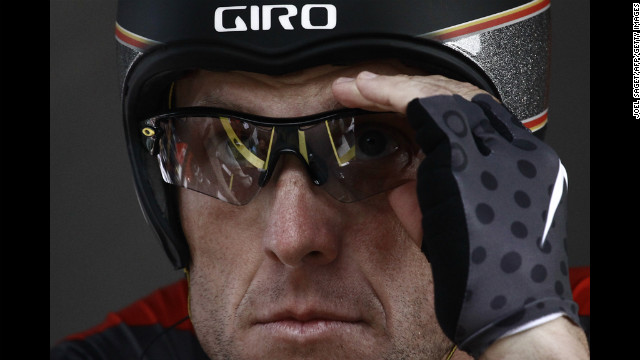 Ahead of what he said would be his last Tour de France, Armstrong gears up for the start of the race in 2010.
Ahead of what he said would be his last Tour de France, Armstrong gears up for the start of the race in 2010. 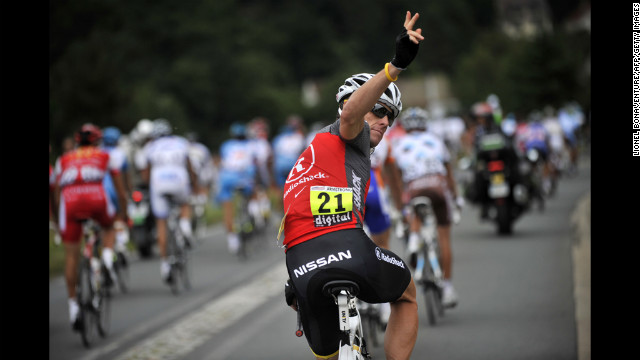 Armstrong finishes 23rd in the 2010 Tour de France. He announced his retirement from the world of professional cycling in February 2011. He said he wants to devote more time to his family and the fight against cancer.
Armstrong finishes 23rd in the 2010 Tour de France. He announced his retirement from the world of professional cycling in February 2011. He said he wants to devote more time to his family and the fight against cancer.  Armstrong's son Luke; twin daughters, Isabelle and Grace; and 1-year-old son, Max, stand outside the Radioshack team bus on a rest day during the 2010 Tour de France.
Armstrong's son Luke; twin daughters, Isabelle and Grace; and 1-year-old son, Max, stand outside the Radioshack team bus on a rest day during the 2010 Tour de France.  The frame of Armstrong's bike is engraved with the names of his four children at the time and the Spanish word for five, "cinco." His fifth child, Olivia, was born in October 2010.
The frame of Armstrong's bike is engraved with the names of his four children at the time and the Spanish word for five, "cinco." His fifth child, Olivia, was born in October 2010. 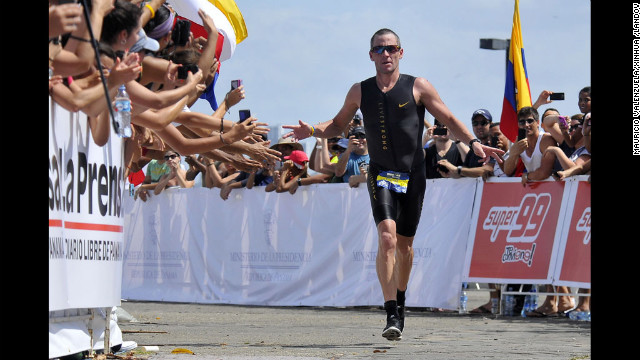 In February 2012, Armstrong competes in the 70.3 Ironman Triathlon in Panama City. He went on to claim two Half Ironman triathlon titles by June. He got back into the sport after retiring from professional cycling.
In February 2012, Armstrong competes in the 70.3 Ironman Triathlon in Panama City. He went on to claim two Half Ironman triathlon titles by June. He got back into the sport after retiring from professional cycling. 



































